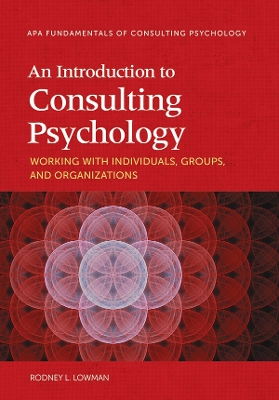Fundamentals of Consulting Psychology
2 total works
The Ethical Practice of Consulting Psychology
by Rodney L. Lowman and Stewart E. Cooper
Published 16 October 2017
Psychologists who work in business and other organizational settings encounter unique ethical issues that are not found in traditional clinical practice. This volume provides an overview of these issues for consulting psychologists, graduate students, and practitioners in other fields who want to transition to organizational consulting. Using the APA Ethics Code as its foundation, the book teaches readers how to make ethical decisions when conducting assessments and applying interventions with individual employees, work groups, and entire organizations, small and large.
Authors Rodney Lowman and Stewart Cooper explore common themes in ethical practice, including informed consent, confidentiality, multiple relationships, conflicts of interest, and competence. They demonstrate how these issues manifest differently in the work environment through vivid case examples that bring to life the concrete work of consulting psychologists. These informative vignettes teach readers how to negotiate complex challenges, such as when organizational demands and corrupt business practices come into conflict with psychologists’ ethical responsibilities. Special attention is also given to emerging areas of practice, including telepsychology, multinational and multicultural consulting, and coaching.
Authors Rodney Lowman and Stewart Cooper explore common themes in ethical practice, including informed consent, confidentiality, multiple relationships, conflicts of interest, and competence. They demonstrate how these issues manifest differently in the work environment through vivid case examples that bring to life the concrete work of consulting psychologists. These informative vignettes teach readers how to negotiate complex challenges, such as when organizational demands and corrupt business practices come into conflict with psychologists’ ethical responsibilities. Special attention is also given to emerging areas of practice, including telepsychology, multinational and multicultural consulting, and coaching.
This book provides a broad introduction to consulting psychology that reviews assessment and intervention at three levels of competency—individual, group, and organizational—including how these levels interact.
Consulting psychology is a burgeoning yet sometimes underappreciated discipline whose goal is to empower clients and improve workplace functioning. In this book, Dr. Lowman describes this fulfilling and important work, translating theory and research into a succinct and accessible overview that will familiarize students, psychologists from multiple disciplines, and others with the field.
Lowman reviews how consultation helps clients at three levels—individual, group, and organizational. Using illustrative case examples, he samples issues that can arise at each level and describes appropriate tools for assessment and intervention.
The various consulting activities surveyed include:
Lowman also considers important professional standards and guidelines for consulting psychologists, including the APA Ethics Code.
Consulting psychology is a burgeoning yet sometimes underappreciated discipline whose goal is to empower clients and improve workplace functioning. In this book, Dr. Lowman describes this fulfilling and important work, translating theory and research into a succinct and accessible overview that will familiarize students, psychologists from multiple disciplines, and others with the field.
Lowman reviews how consultation helps clients at three levels—individual, group, and organizational. Using illustrative case examples, he samples issues that can arise at each level and describes appropriate tools for assessment and intervention.
The various consulting activities surveyed include:
- screening potential job candidates;
- coaching individuals to help them adapt to new roles and manage relationships with colleagues;
- evaluating and improving work group dynamics, such as communication patterns; and
- working with different organizational cultures to enhance system-wide processes and structures.
Lowman also considers important professional standards and guidelines for consulting psychologists, including the APA Ethics Code.

